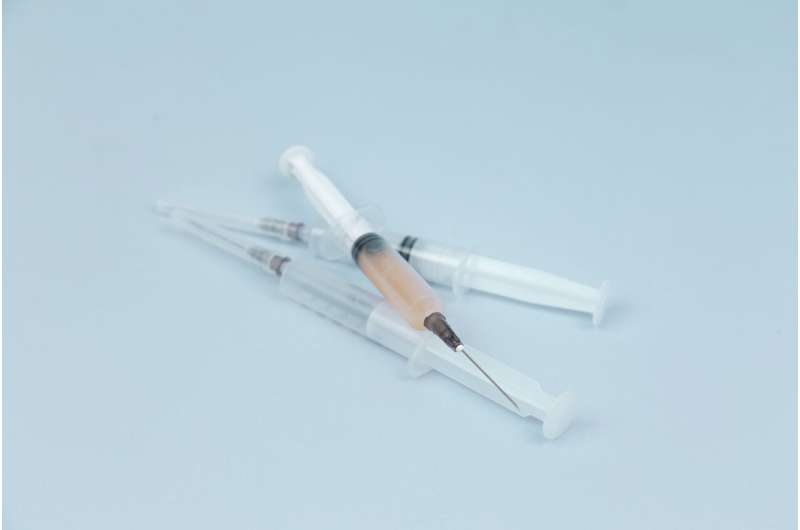Credit: Unsplash/CC0 Public Domain
Norway is expected to receive 1,400 vaccines for use in connection with the monkeypox outbreak. This vaccine has been approved for use against monkeypox as a two-dose vaccine by the medicine agencies, so there are sufficient doses to fully vaccinate 700 people with this delivery. The vaccines are expected to arrive in Norway during August, and the Norwegian Institute of Public Health has given a recommendation for their use.
"It should be a goal that groups in Norway with a particularly increased risk of infection with monkeypox are offered vaccination. This will primarily be men who have sex with men and who practice unsafe sex (many and/or random partners). If vaccination is as effective against infection and disease as expected, this will influence the epidemic in Norway and reduce disease," says Geir Bukholm, Assistant Director-General.
Recommend vaccinating close contacts at high risk of severe disease course
The Norwegian Institute of Public Health has recommended that the Ministry of Health and Care Services should use the very limited number of doses to vaccinate high-risk close contacts of those with confirmed infection (post-exposure prophylaxis), such as sexual contacts, household members and others with significant exposure, after an individual assessment of the benefits and risks of vaccination.
Close contacts with a high risk of a severe disease course if they are infected are given priority, but an individual assessment of benefits and risks must also be carried out. Groups with an increased risk of a severe disease course include young children, pregnant women and people with an impaired immune system. The aim is to prevent a severe disease course.
In the longer term, with access to more vaccine doses, people with a particularly high risk of infection should be prioritized for vaccination (pre-exposure prophylaxis). The assessment is based on the current situation, knowledge and access to a very limited number of vaccines. If the situation changes, a new assessment will be carried out with updated recommendations.
Alternative strategies
In the current situation, three strategies for vaccination against monkeypox are appropriate:
- Pre-exposure vaccination (also called pre-exposure prophylaxis, PrEP). People are vaccinated before they are exposed to the virus. Since the risk of becoming infected is so unevenly spread in the population and the vaccine is only available in limited numbers, PrEP is most appropriate for people at the highest risk of infection.
- Post-exposure vaccination (also called post-exposure prophylaxis, PEP). People are vaccinated as soon as possible after exposure to infection. Vaccination should be offered as soon as possible, preferably within 4 days of exposure, but can be considered up to 14 days after the last exposure. People who have already developed symptoms should not be vaccinated. It is uncertain whether post-exposure vaccination reduces further transmission, so vaccinated people should follow infection control advice in the same way as unvaccinated contacts.
- Combination of pre-exposure and post-exposure prophylaxis.
"Based on the extremely limited number of vaccine doses that we expect, strict prioritization will be necessary in 2022 based on the probability of infection and the risk of a severe disease course," says Bukholm. "Strict prioritization is also necessary to achieve a good benefit/risk balance for vaccination. If more vaccine doses become available, the strategy can be changed," he adds.
Currently, there are no vaccines developed specifically against monkeypox. The vaccine being offered is a third-generation vaccine developed to prevent smallpox that can be used either before or after exposure to infection (pre- or post-exposure prophylaxis).
Provided by Norwegian Institute of Public Health
























